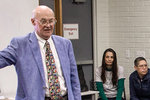

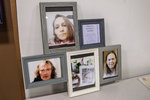
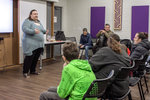
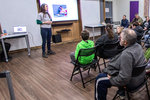
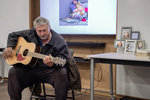

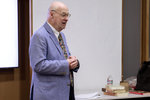
As the housing crisis continues nationwide, more people seem to be slipping into homelessness.
The paths that lead people there are more plentiful than ever, according to Friends Without Homes certified peer specialist Lisa Striedinger, who organized a public forum at the Centralia Timberland Library last Saturday to discuss “myths and facts” surrounding homelessness.
Around 25 people filled the meeting room in the library for the forum.
Striedinger was one of five speakers who talked about their past experiences with homelessness, including former Bremerton businessman-turned-author Richard LeMieux, who has experienced homelessness personally.
Originally from Ohio, LeMieux moved to Washington in 1981. He worked as a state Republican Party fundraiser and managed his own publishing company, The Source, which produced medical and university directories until the business failed in 2002 and LeMieux found himself without a home.
Before LeMieux told his story though, Striedinger and the other speakers shared their own life experiences.
The Stories of Striedinger, Smiley, Loney and Roger
When homeless, Striedinger said she used local resources and outreach centers such as the Lewis County Gospel Mission and the Salvation Army. She felt she had an easier time navigating those resources than most.
“I used the services and they were available to me because I hadn’t hit the bottom of the barrel yet. I was not chronically homeless yet. I wasn’t to the point where I was invisible and nobody gave a damn about me,” Striedinger said.
She said a large portion of the homeless population gets overlooked as people believe they’re addicts, lazy or choosing to be homeless. She touched on how many experiencing homelessness face challenges just getting basic items such as proper identification, which is needed for housing and employment. Many also struggle with both mental illness and physical disabilities with no access to health care.
Striedinger said those issues drove her to organize the forum, the first of many she has planned to further shed light on the various causes of the homelessness crisis facing the country.
“It brings people together to try to debunk these myths,” Striedinger said.
The forum was also a makeshift memorial service in honor of Natasha Clancy, Brian Kelly and Trina Landry, all of whom Striedinger knew from her time without a home. All three of them died while experiencing homelessness, she said.
“Trina Landry lost her life to a city ordinance that said you cannot go back into the city limits in Seattle and she ended up losing her life in the woods,” Striedinger said. “Those opportunities I was given should have been given to her as well.”
After Striedinger finished, Cristy Smiley shared her experience with homelessness, which is ongoing. Smiley said she is a childhood abuse survivor. Since 2011, she has spent more time homeless than being housed, she said.
Due to the trauma she suffered as a child, bad treatment from others was something she thought was normal. She accepted it for a good portion of her life, she said.
“I didn’t realize it was toxic until I became an adult and realized that childhood trauma, trauma in general, is real. It affects you not only deeply, emotionally, mentally, physically, but it also affects your surroundings and who you allow yourself to be with,” Smiley said.
During the years she spent homeless, whether staying at a shelter or couch surfing, she was employed most of the time, she said. Smiley currently works as a school bus driver and is also a mother of two.
She talked about how in order to qualify for certain homeless outreach programs, applicants must make less than a certain amount of money. She said she would have to quit jobs to try to find ones with lower pay to be able to qualify for those resources. Smiley said she had to quit a job at Wendy’s as she was making too much money there to qualify for assistance.
Though she now has a rental home and still works, Smiley said she lives paycheck to paycheck and is one medical emergency or car breakdown away from being unable to pay rent.
“This is a two-income society, and unfortunately not a lot of people know how to do two incomes,” Smiley added.
Aly Loney spoke about her experience with homelessness after Smiley finished speaking.
“I was at home raising my kids. I had everything going (for me), had a job, but I got a hernia,” Loney said.
She had a mesh patch implanted but ended up getting an infection from it that almost killed her, she said, and she has been disabled since then. She and her husband used to own a home in Moses Lake but lost it due to taxes and family issues, she said.
Since she can’t afford to see a doctor anymore, she legally is no longer considered disabled and can’t collect Social Security or disability, she said.
“Looking for a job is almost impossible if you don’t have skills behind you. You don’t have backing. They don’t want to hire you because they’re liable. You’re gonna cost (them) money,” Loney said.
As she’s still disabled, the jobs she can do aren’t bountiful, she said. Loney also said she’s known in the area for being chronically homeless and admitted she has gotten into trouble in the past.
“I’ve done things I’m not proud of, and even though we slept on the sidewalk last night in a sleeping bag, we’re still here, we’re still walking, still doing what we need to do,” Loney said. “Still looking for a job, still filling out applications on the daily, still going to my Bible study, doing everything I can to better myself.”
Robert Roger, who found himself experiencing homelessness two years ago, shared his story. He admitted that while he still struggles with alcoholism and drugs, addiction is something both the homeless and the housed face.
“There’s a myriad of things that happen to people (to make them homeless). Sometimes it’s not your fault. The first thing I think you gotta do if you’re homeless, don’t blame yourself. Even if it was your fault, accept it and then stop blaming yourself from then on. Because the first thing you’ve gotta do is stand back up,” Roger said, later adding, “I have to fight (addiction) every day, whether I’m housed or not.”
He then played a rendition of Luke Bryan’s song “Drink a Beer” — a song about losing friends — in honor of those he knew who died while experiencing homelessness, including Clancy, Kelly and Landry.
The Story of Richard LeMieux
Following his business’s failure in 2002 and losing his home, LeMieux ended up living in a van with his dog, Willow. Because he had gone from being a fairly wealthy and successful businessman to living on the streets, he fell into deep depression that eventually drove him to attempt suicide, he said.
He told those in attendance that Willow was the one who saved his life as he was preparing to jump off the Tacoma Narrows Bridge.
“I put a bowl of water on one floorboard and a bowl of food on the other and then I put a note on the dashboard that said, ‘This is my dog Willow. When you find her, please love her,’ because I was thinking, ‘That’s gonna be better for her,’” LeMieux said, later adding, “When I got out there and put my hands on the railing and started climbing up over that, I for sure thought that was going to be the end, but in my head, I could hear my dog barking.”
LeMieux thought he walked off far enough from where he left his van that he wouldn’t be able to hear Willow bark, but every time he put his hands on the rails he could hear Willow’s barking, he said. He decided to go back to the van.
After that, he ended up in a breakfast line at the Salvation Army in Bremerton, where he began his road to recovery.
That breakfast, one of many that he would eat at the Salvation Army, ended up being the inspiration for the title of his book, Breakfast at Sally’s, which he typed out over a period of nearly three years while still being homeless on a second-hand typewriter, often at picnic tables in parks or in the back of various shelters he stayed at.
In his book, he details the many stories of the many people he met, including how there are countless ways in which a person can end up finding themselves homeless.
One other thing he learned during his time on the streets is how those experiencing homelessness often only get help from others in their same position.
LeMieux told the audience one of the biggest problems those experiencing homelessness face is apathy from those who aren’t, something he himself was guilty of before he found himself homeless.
“Quite frankly, I didn’t really care about the homeless. If you were in Seattle on the streets, I would just walk right by you and pretend I didn’t see you,” said LeMieux, later adding, “If somebody in this room thinks they can’t be homeless, they’re wrong.”
He also touched on generational homelessness, situations in which children are born to parents who are homeless. LeMieux said there are currently over 33,000 children experiencing homelessness in Washington state.
Now that he’s back on his feet, LeMieux travels the country speaking as an advocate for those still struggling without homes. His book can be found at most major retailers and book stores. He can be contacted at breakfast.at.sallys@gmail.com.
Though his dog Willow has died, there are now seven homeless shelter programs named after her.
Friends Without Homes is a Lewis County nonprofit organization focused on providing those experiencing homelessness with resources and aid. At the end of the forum, Striedinger announced the next homelessness forum will be held at the Vernetta Smith Chehalis Timberland Library on June 6 at 4 p.m.
For more information, visit https://friendswithouthomes20.galaxysites.org/.